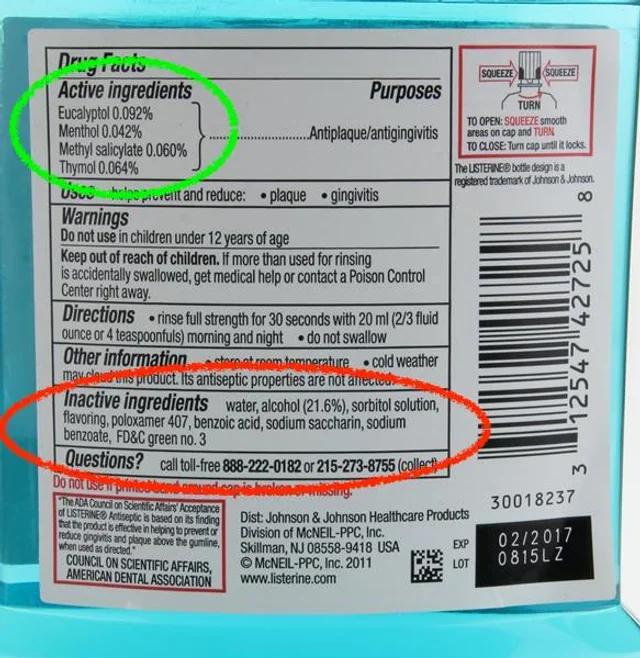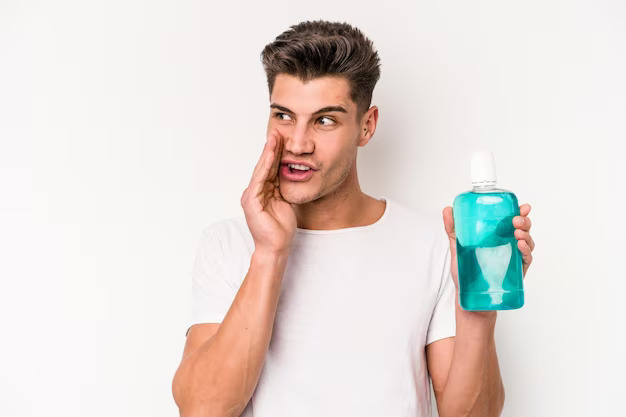If you just had your wisdom teeth removed, you may be squeaking in pain from the swollen gums and the surgical site. You’ve already taken a significant step towards maintaining your oral health by getting your wisdom teeth removed. The second part involves the healing of the wound and ensuring a speedy recovery.
However, the immediate aftermath of wisdom teeth removal can be a bit tricky to navigate. You might be wondering about proper care, potential risks, and what activities are safe during the healing process. One common question that arises is whether it’s okay to use mouthwash after wisdom teeth removal.
The short answer is NO, you should not use mouthwash at least 24 hours after the removal of your wisdom teeth. This is to prevent the mouthwash from irritating the surgical site and potentially causing a dry socket. A dry socket is a painful complication where the blood clot that formed on the surgical wound is dislodged, exposing the nerve and bones to any irritants in the mouth.
In the rest of this article, we will explore what a mouthwash contains, when it is safe to incorporate mouthwash into your daily care regimen, and what you should do after your wisdom teeth removal surgery.
What Do Mouthwash Contain?
Mouthwash, also known as oral rinse or mouth rinse, is a liquid product designed for use in the oral cavity, primarily as an adjunct to regular oral hygiene practices such as brushing and flossing.
Mouthwash is swished around the mouth, gargled, or used as a rinse, with the aim of providing various oral health benefits. Different mouthwash may contain specific formulation depending on the specific type and purpose of the mouthwash.
You may be interested in: Does Flossing Whiten the Teeth?
Therapeutic mouthwashes are designed to provide specific therapeutic benefits for oral health. They often contain active ingredients that are aimed at preventing cavities, reducing plaque, combating gum disease, or addressing other oral issues. On the other hand, cosmetic focuses on temporarily freshening the breath and providing a pleasant taste, and do not provided any form of therapeutic benefits. Last but not least, prescription mouthwashes may be recommended by dentists or healthcare professionals for specific oral conditions or post-surgical care.

Here are some common ingredients found in various types of mouthwashes:
- Antibacterial Agents: These ingredients help fight bacteria and control plaque buildup in the mouth. Common antibacterial agents include:
- Chlorhexidine: A powerful antiseptic often used in therapeutic mouthwashes.
- Cetylpyridinium chloride (CPC): Another antiseptic agent with antibacterial properties.
- Fluoride: Often found in mouthwashes designed to strengthen teeth and prevent cavities. Fluoride helps remineralize enamel and makes teeth more resistant to acid attacks.
- Alcohol: Some mouthwashes contain alcohol, such as ethanol, which can act as an antiseptic. However, alcohol-free options are available, as alcohol can cause dryness or irritation in some individuals.
- Essential Oils: Natural extracts like eucalyptol, menthol, thymol, and methyl salicylate are used for their antimicrobial properties and to provide a fresh feeling in the mouth.
- Humectants: These help retain moisture in the mouthwash and prevent it from drying out. Common humectants include glycerin and sorbitol.
- Surfactants: Some mouthwash may contain surfactants such as sodium lauryl sulfate. These help disperse and mix the ingredients in the mouthwash. Surfactants can also assist in loosening debris and food particles.
- Flavoring Agents: Mint, peppermint, spearmint, and other flavors are used to make the mouthwash more pleasant to use.
- Colorants: Mouthwashes may contain color additives to enhance the appearance of the product.
- Water: The primary solvent in most mouthwashes, diluting the active ingredients and allowing for easy rinsing.
- Additional Therapeutic Ingredients: Some mouthwashes are designed to address specific oral health concerns, such as reducing sensitivity or treating gum disease. These may contain additional active ingredients, such as aloe vera, hydrogen peroxide, or herbal extracts.
Before you purchase a mouthwash, it is important that you read the product label, especially if you have allergies or specific oral health needs. If you have any doubts, consult with your dentist or healthcare provider and they can help you choose the most appropriate mouthwash for your post-surgery recovery and oral care routine.
When Can You Use Mouthwash After Wisdom Teeth Removal?
It is widely recommended by dentists and oral surgeons that you should only use a mouthwash at least 24 to 48 hours after your surgery. The initial period after surgery is crucial for blood clot formation and wound healing in the extraction sites.
Typically, you’ll be instructed to avoid rinsing or spitting forcefully to prevent dislodging the blood clot. Failure to provide proper care can lead to irritation of your surgical wound and in some cases, an infection.
You may be interested in: Will Listerine Kill Tooth Infection?
After the first two days, consult your oral surgeon for advice. You may be given the green light to use a mild, alcohol-free mouthwash. Gently swish the mouthwash around your mouth, especially around the extraction sites.
Even after the initial 48-hour period, continue to be cautious with the use of mouthwash.After a week, your wound should have sufficiently healed and you can return to your original oral hygiene habits. If you experience any discomfort or notice any negative effects, stop using it and consult your oral surgeon.
How to Rinse Mouth After the Surgery?
During the first 2 days after your surgery, use a saltwater rinse instead of a mouthwash. Here’s a step-by-step guide on how to rinse your mouth after surgery:
- Prepare the Saltwater Solution: Dissolve half a teaspoon of salt in 8 ounces (about 240 ml) of warm water. The water should be comfortably warm, but not hot. Stir the mixture until the salt is completely dissolved.
- Gently Swish Solution in Mouth: Take a small sip of the prepared saltwater solution. Gently move the solution around your mouth, especially in the areas where the surgery was performed, for about 30 seconds. Be especially cautious around the extraction sites. Avoid direct pressure on the surgical areas.
- Let Solution Dribble Out of Mouth: Lean over the sink and let the solution gently dribble out of your mouth. Be sure not to spit as you risk causing dry socket.
- Repeat as Needed: You can repeat the gentle rinsing process after meals, but be sure to follow your oral surgeon’s instructions on frequency and duration.
As mentioned earlier, avoid using regular mouthwash in the initial days after surgery, especially if it contains alcohol or harsh chemicals. Also, continue to brush your teeth gently, but avoid brushing directly over the surgical sites. Use a soft-bristle toothbrush.
Remember, proper post-operative care can significantly impact the healing process. If you’re unsure about how to rinse your mouth or have any questions, don’t hesitate to reach out to your oral surgeon or dental professional for guidance.
Closing Thoughts
As we’ve explored in this article, the timing and approach to using mouthwash after wisdom teeth removal are vital. The immediate aftermath of the surgery requires a period of caution, allowing blood clots to form and wounds to heal. Rushing into using mouthwash could potentially lead to complications such as dry socket, which can disrupt your healing process and cause discomfort.
Typically, waiting for about 24 to 48 hours before gently introducing a mild, alcohol-free mouthwash is the recommended approach. This measured timeline helps ensure that you’re nurturing the healing process rather than hindering it.
As you continue to recover, always remember that personalized care and open communication with your dentist or oral surgeon are key to a successful healing process. They have the best knowledge of your current condition and will be able to give personalized advice based on your recovery.







